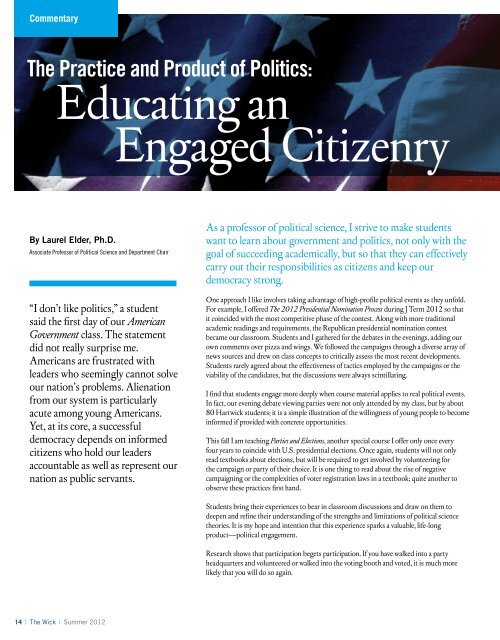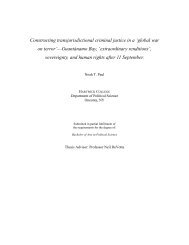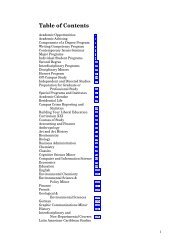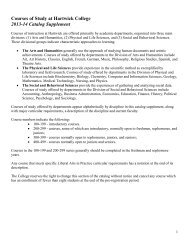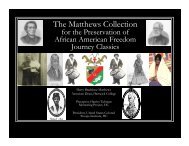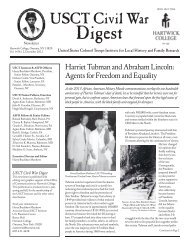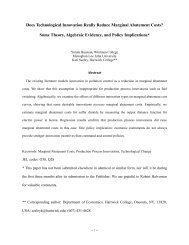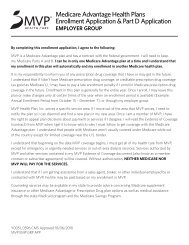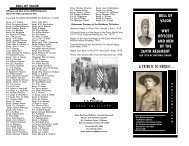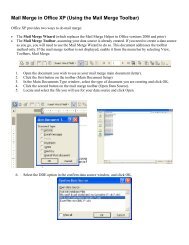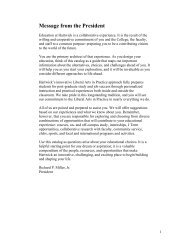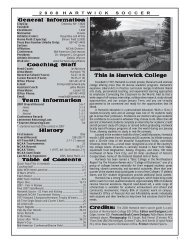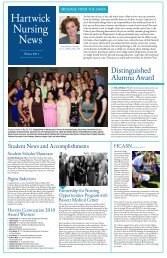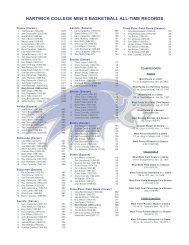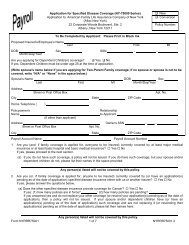Process and Progress through the Liberal Arts - Hartwick College
Process and Progress through the Liberal Arts - Hartwick College
Process and Progress through the Liberal Arts - Hartwick College
Create successful ePaper yourself
Turn your PDF publications into a flip-book with our unique Google optimized e-Paper software.
Commentary<br />
The Practice <strong>and</strong> Product of Politics:<br />
Educating an<br />
Engaged Citizenry<br />
By Laurel Elder, Ph.D.<br />
Associate Professor of Political Science <strong>and</strong> Department Chair<br />
“I don’t like politics,” a student<br />
said <strong>the</strong> first day of our American<br />
Government class. The statement<br />
did not really surprise me.<br />
Americans are frustrated with<br />
leaders who seemingly cannot solve<br />
our nation’s problems. Alienation<br />
from our system is particularly<br />
acute among young Americans.<br />
Yet, at its core, a successful<br />
democracy depends on informed<br />
citizens who hold our leaders<br />
accountable as well as represent our<br />
nation as public servants.<br />
14 | The Wick | Summer 2012<br />
As a professor of political science, I strive to make students<br />
want to learn about government <strong>and</strong> politics, not only with <strong>the</strong><br />
goal of succeeding academically, but so that <strong>the</strong>y can effectively<br />
carry out <strong>the</strong>ir responsibilities as citizens <strong>and</strong> keep our<br />
democracy strong.<br />
One approach I like involves taking advantage of high-profile political events as <strong>the</strong>y unfold.<br />
For example, I offered The 2012 Presidential Nomination <strong>Process</strong> during J Term 2012 so that<br />
it coincided with <strong>the</strong> most competitive phase of <strong>the</strong> contest. Along with more traditional<br />
academic readings <strong>and</strong> requirements, <strong>the</strong> Republican presidential nomination contest<br />
became our classroom. Students <strong>and</strong> I ga<strong>the</strong>red for <strong>the</strong> debates in <strong>the</strong> evenings, adding our<br />
own comments over pizza <strong>and</strong> wings. We followed <strong>the</strong> campaigns <strong>through</strong> a diverse array of<br />
news sources <strong>and</strong> drew on class concepts to critically assess <strong>the</strong> most recent developments.<br />
Students rarely agreed about <strong>the</strong> effectiveness of tactics employed by <strong>the</strong> campaigns or <strong>the</strong><br />
viability of <strong>the</strong> c<strong>and</strong>idates, but <strong>the</strong> discussions were always scintillating.<br />
I find that students engage more deeply when course material applies to real political events.<br />
In fact, our evening debate viewing parties were not only attended by my class, but by about<br />
80 <strong>Hartwick</strong> students; it is a simple illustration of <strong>the</strong> willingness of young people to become<br />
informed if provided with concrete opportunities.<br />
This fall I am teaching Parties <strong>and</strong> Elections, ano<strong>the</strong>r special course I offer only once every<br />
four years to coincide with U.S. presidential elections. Once again, students will not only<br />
read textbooks about elections, but will be required to get involved by volunteering for<br />
<strong>the</strong> campaign or party of <strong>the</strong>ir choice. It is one thing to read about <strong>the</strong> rise of negative<br />
campaigning or <strong>the</strong> complexities of voter registration laws in a textbook; quite ano<strong>the</strong>r to<br />
observe <strong>the</strong>se practices first h<strong>and</strong>.<br />
Students bring <strong>the</strong>ir experiences to bear in classroom discussions <strong>and</strong> draw on <strong>the</strong>m to<br />
deepen <strong>and</strong> refine <strong>the</strong>ir underst<strong>and</strong>ing of <strong>the</strong> strengths <strong>and</strong> limitations of political science<br />
<strong>the</strong>ories. It is my hope <strong>and</strong> intention that this experience sparks a valuable, life-long<br />
product—political engagement.<br />
Research shows that participation begets participation. If you have walked into a party<br />
headquarters <strong>and</strong> volunteered or walked into <strong>the</strong> voting booth <strong>and</strong> voted, it is much more<br />
likely that you will do so again.


